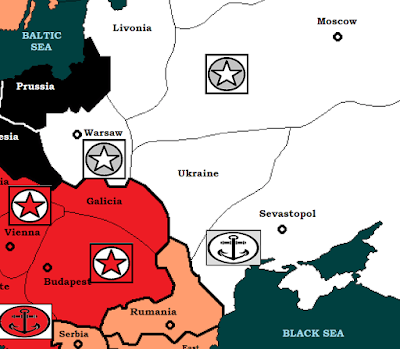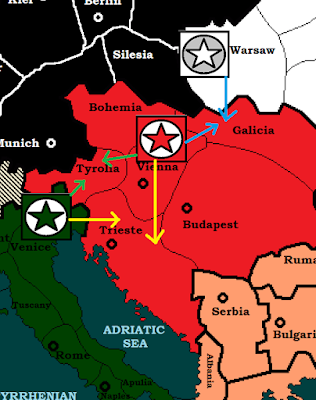When thinking about the Diplomacy board you may think of dividing it into zones. A traditional division is to split the board into two parts: the Northern (or Western) Triangle, featuring England, France and Germany, and the Southern (Eastern) Triangle of Russia, Austria-Hungary and Turkey.
Personally, though, I prefer to narrow down the areas of the board and consider the possibilities there. I therefore have a number of 'theatres' that I consider, and the Black Sea Theatre is one of them.
For Austria-Hungary to get to the Black Sea, she has to take 5 turns, and that assumes there's no opposition in her way. Given that Turkey isn't going to let her enter Constantinople on turn 4, if at all, it is extremely unusual for Austria to get a fleet in the Black Sea. Even more unusual when you consider that Italy will also want to be involved in the east end of the Med, and that Austrian players regularly focus on armies rather than fleets, at least initially.
 |
| Black Sea Theatre |
So why is Austria being discussed? Well, simply, because her fleet presence may be non-existent but her armies can quite easily affect the theatre via her presence in a neighbouring theatre, the Balkans.
Austria could be in control of the Balkans, theoretically, by the end of 1902 - more quickly than she can get an unopposed fleet into the Black Sea:
- Spring 1901: A(Bud)-Ser, A(Vie)-Gal, F(Tri)-Alb
- Fall 1901: A(Ser) S Gal-Rum, F(Alb)-Gre
- Winter 1901: Build A(Bud), A(Vie), F(Tri)
- Spring 1902: F(Gre) S Rum-Con, A(Ser) S Rum-Con, A(Vie) S Bud-Gal
- Fall 1902: F(Gre) S Con H, A(Con) S Gal-Rum, A(Ser) S Gal-Rum, A(Vie)-Gal
OK, being realistic, this isn't likely to happen. Austria has pressure from the Italian army in Venice (not seen on the above image), and Turkey & Russia aren't likely to allow Austrian hegemony in the Balkans so quickly. But we're talking potential, here.
Get Real
Let's look at the impact Austria is more likely to have on the Black Sea theatre. There are a number of spaces - almost all of them Balkan spaces - that Austria-Hungary influences.
 |
| Galicia |
We'll start with the non-Balkan space. Galicia is a hot space: it isn't unusual for Austria to order A(Vie)-Gal and Russia to order A(War)-Gal in Spring 1901. Neither wants the other there, and a stand-off is better than having an enemy army occupying the space.
However, it isn't as rare as you might think for Austria to agree to Russia moving War-Gal. The agreement is that, in F01, Russia orders A(Gal)-Rum. The problem is, for Austria, that a Russian army in Galicia threatens both Vienna and Budapest, and if Russia orders - for example - A(Gal) S Ukr-Rum/Sev-Rum, leaving that army in Galicia, then Austria has bigger problems.
There is a way around this issue: Austria could agree to War-Gal and Gal-Rum and ensure it by telling Russia she will order A(Vie)-Gal in F02, which cuts Russian support for any other move from Galicia. In other words: "You can do it but I'm moving to Galicia in Fall."
Still, what kind of Austrian player wants to hold an army in Vienna, or order A(Vie)-Bud, in Spring 1901? There are better moves - almost any other move is better. A(Vie)-Tyl prevents Italy ordering A(Ven)-Tyl, or gets Austria in a strong position against Italy; A(Vie)-Tri blocks Italy's A(Ven)-Tri and allows the Austrian fleet to move, and A(Vie)-Gal we've discussed above.
 |
| A(Vie) moves |
Should A(Vie)-Gal work, though, Russia faces an aggressive army bordering Warsaw (and she can't afford to hope Austria doesn't move Gal-War) and Rumania. If we assume Austria has made the almost certain S01 move of A(Bud)-Ser, then Austria has two armies to attack Rumania (and a possible support from Turkey's army in Bulgaria). If Austria made the less usual opening of A(Bud)-Rum there are two possible outcomes: if the order succeeded, Austria has an army in Galicia to support the army in Rumania, or to allow A(Rum)-Ser, while ordering A(Gal)-Rum to hopefully keep Russia out; if A(Bud)-Rum failed in S01, Austria can order A(Gal)-Rum and A(Bud)-Ser, or have the two armies support to capture Rumania.
An Austrian in Galicia is aggressively anti-Russian. Russia can't really afford it: Warsaw is vulnerable, Rumania is under pressure, and her Black Sea strategy is struggling.
Serbia
Below is a not unusual image of the Balkans in Fall 1901:
 |
| Spring 1901 moves |
The orders were:
Austria-Hungary: F(Tri)-Alb, A(Bud)-Ser, A(Vie)-Gal
Turkey: A(Con)-Bul, F(Ank)-Con
Russia: F(Sev)-BLA, A(War)-Mos
In the Black Sea theatre, much will depend on what Russia ordered her Muscovite army to do, as well as the Turkish orders for her Smyrnan army. If A(Mos)-StP, Russia is risking that there isn't an Austro-Turkish alliance; if she ordered A(Mos)-Sev, then she's pushing hard for Rumania.
Turkey has two realistic orders for her army in Smyrna: either A(Smy)-Ank, which is not very useful except to guard Ankara from a potential F01 order from Russia of F(BLA)-Ank/Con; or A(Smy)-Arm, which also defends Ankara - with the orders F(Con)-Ank and A(Arm)-Ank - but also threatens Sevastopol - Armenia neighbours Sevastopol.
For Austria, though, that army in Serbia is extremely useful. From Serbia, Austria can support F(Alb)-Gre, or it can support any attack on Rumania... or even move to Rumania itself with support from A(Gal) and/or A(Bul).
For me, the strength of this position for Austria is that she now dominates the Balkans, although she only controls the single space. Serbia is hers - she has a build. It isn't great on its own - she needs more than one build ideally - but it means she can give Rumania and Greece as gifts. She has the key to the alliance structure in the Balkan and Black Sea theatres.
The other thing about Serbia is that Austria really can't afford to not take it in S01. If she orders A(Bud)-Rum, successfully or not, Serbia sits empty with a Turkish army in Bulgaria. While she may be able to force the issue in F01, it is a problem.
Greece
Ostensibly, Greece is nothing to do with the Black Sea theatre, being firmly in the Balkan theatre. But look at what an Austrian presence in Greece allows:
 |
| Austria in Greece |
If Austria is in Greece, the chances are she's also in Serbia. This puts two units bordering Bulgaria. For a fleet to move there, it moves to Bulgaria's south coast, which can only affect Constantinople. However, Constantinople is the key to getting into, and out from, the Black Sea. An army in Greece gives access to Bulgaria and, from there, Constantinople and Rumania.
If Austria is to impact fully on the Black Sea theatre, she needs to be in Greece. Of course, a good Turkey will recognise this. At the end of Spring 1901, Turkey will have an army in Bulgaria, Austria is likely to have an army in Serbia and - possibly - a fleet in Albania.
Austria, then, has the advantage. A(Ser) S Alb-Gre succeeds - unless Turkey and Italy can come to some arrangement which will be something like A(Bul) S ION-Gre - given an Italian order in S01 of F(Nap)-ION - or A(Bul) S Nap/Apu-Gre - given an accompanying Italian order of A(Rom)-Nap/Apu. There's really no reason why Italy would support A(Bul)-Gre unless Italy is in - or expecting to be in - Trieste/Venice; without this expectation, Italy is giving up her only build in 1901.
The alternative for Italy is to let Austria into Greece and for Italy to build in Naples in 1901. Imagine, now, Italy sailing into the Ionian in S02, with an Austrian fleet in Greece able to support Italy from the Ionian to the Aegean. (The problem with this seafaring alliance against Turkey is that is takes ages to come off, unless Italy is happy to hold on to just three units in 1901.)
Rumania
I've mentioned Rumania previously, and discussed it in the Russia post for the Black Sea theatre, so I don't want to spend too much time on Rumania again.
Perhaps Austria's impact on Rumania is more to do with preventing Russia from taking the space. Should Austria order the aggressive A(Bud)-Rum and A(Vie)-Gal in S01, there is a fair chance that she will need help from Turkey to hold it - assuming either order succeeds. If both orders are bounced - Russia orders A(War)-Gal & F(Sev)-Rum - then Austria has to struggle to get any builds in 1901. And, if Russia also orders A(Mos)-Ukr, she will take Rumania, if only because Turkey will be happy to see Austria baulked and Russia delayed - she's unlikely to work with an Austria who has so poorly read the moves on the board.
Let's assume Austria actually gets into Rumania in S01... what then? Russia will have two units neighbouring, at least. Can Austria hold on to Rumania? Probably not.
Austria's best hope of gaining Rumania is an Austro-Turkish alliance... or supporting Turkey into Rumania. Either, though, is a significant enough outcome to make Austrian involvement in Rumania a strategically significant event in the Black Sea theatre.
Austria-Hungary and the Black Sea theatre
Austria's impact on the Black Sea theatre is mainly through her influence via the Balkans. It requires a strong, determined Austria. Fortunately for both Russia and Turkey, these are few and far between.
Heathley Baines (Nibbler)
Editor
The Series "The Black Sea Theatre"
Part 1: "Introduction"
Part 2: "The Super Fleet"
Part 3: "Turkey"
Part 4: "Russia"
Part 5: "Austria Goes Balkans"
Comments
Post a Comment